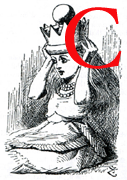 ertainly the order of the world that Conrad sets forth with such diabolical eloquence and plausibility is no banal moral order, no childish sequence of virtuous causes and edifying effects. Rather it has an atheistic and even demoniacal smack: to the earnest Bible-student it must be more than a little disconcerting. The God he visualizes is no loving papa in a house-coat and carpet-slippers, inculcating the great principles of Christian ethics by applying occasional strokes a posteriori. What he sees is something quite different: an extremely ingenious and humorous improvisatore and comedian, with a dab of red on his nose and maybe somewhat the worse for drink—a furious and far from amiable banjoist upon the human spine, and rattler of human bones. . . .
ertainly the order of the world that Conrad sets forth with such diabolical eloquence and plausibility is no banal moral order, no childish sequence of virtuous causes and edifying effects. Rather it has an atheistic and even demoniacal smack: to the earnest Bible-student it must be more than a little disconcerting. The God he visualizes is no loving papa in a house-coat and carpet-slippers, inculcating the great principles of Christian ethics by applying occasional strokes a posteriori. What he sees is something quite different: an extremely ingenious and humorous improvisatore and comedian, with a dab of red on his nose and maybe somewhat the worse for drink—a furious and far from amiable banjoist upon the human spine, and rattler of human bones. . . .
One of the curiosities of critical stupidity is the doctrine that Conrad is without humor. No doubt it flows out of a more general error: to wit, the assumption that tragedy is always pathetic, that death itself is inevitably a gloomy business. That error, I suppose, will persist in the world until some extraordinarily astute mime conceives the plan of playing King Lear as a farce — I mean deliberately. That it is a farce seems to me quite as obvious as the fact that Romeo and Juliet is another, this time lamentably coarse. To adopt the contrary theory — to view it as a great moral and spiritual spectacle, capable of purging and uplifting the psyche like marriage to a red-haired widow or a month in the trenches — to toy with such notions is to borrow the critical standards of a party of old ladies weeping over the damnation of the heathen. In point of fact, death, like love, is intrinsically farcical — a solemn kicking of a brick under a plug-hat — and most human agonies, once they transcend the physical — i.e., the unescapably real — have far more of irony in them than of pathos. Looking back upon them after they have eased one seldom shivers: one smiles — perhaps sourly but nevertheless spontaneously. This, at all events, is the notion that seems to me to be implicit in every line of Conrad. I give you Heart of Darkness as the archetype of his whole work and the keystone of his metaphysical system. Here we have all imaginable human hopes and aspirations reduced to one common denominator of folly and failure, and here we have a play of humor that is infinitely mordant and searching. . . . One hears transcendental mirth, echoing and re-echoing down the black corridors of empty space. [240].
Related material
Bibliography
Mencken, H. L. H. L. Mencken’s “Smart Set” Criticism. Ed. William H. Nolte. Ithaca, N. Y.: Cornell University Press, 1968.
Last modified 30 September 2017